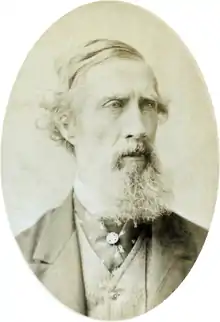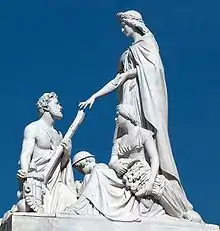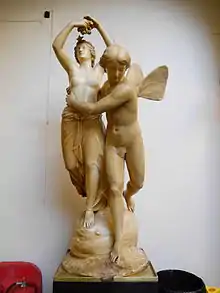William Calder Marshall
William Calder Marshall RA (18 March 1813 – 16 June 1894) was a Scottish sculptor.
William Calder Marshall | |
|---|---|
 | |
| Born | 13 March 1813 |
| Died | 16 June 1894 (aged 81) London |
| Nationality | Scottish |
| Education | Royal Academy school; Francis Chantrey; Edward Hodges Baily, |
| Known for | Sculpture |
Life
He was born at Gilmour Place in Edinburgh, the eldest son of William Marshall a goldsmith with a shop at 1 South Bridge[1] and his wife Annie Calder.[2]
He attended the Royal High School and Edinburgh University before enrolling at the Trustees Academy in 1830 before enrolling in the Royal Academy school in London in 1834, where he won the silver medal. He studied under Francis Chantrey and Edward Hodges Baily, and then, in 1836 went to Rome to pursue his study of classical sculpture, staying for two years.
In 1844, he participated in an exhibition held at Westminster Hall to select artists to decorate the rebuilt Palace of Westminster. It proved to be the turning point of his career, leading to many commissions for public monuments not only for the new Houses of Parliament - for which he made statues of the Lord Chancellors Clarendon and Somers, and of Chaucer[3] but also for Westminster Abbey and St. Paul's Cathedral. He made the colossal bronze of Robert Peel for Manchester; with figures representing the city, illustrative of manufactures and commerce, and another, symbolising the arts and sciences, at the base of the pedestal.[3]


His monument to Edward Jenner, the discoverer of vaccination was set up in the south-west corner of Trafalgar Square in 1858 and inaugurated at a ceremony presided over by Prince Albert. The statue, which depicted Jenner sitting in a chair in a relaxed pose, was moved to Kensington Gardens in 1862.[4][5]
In June 1864, Calder Marshall was commissioned to make an allegorical group representing Agriculture, one of the four representing various "skills" to be installed on the Albert Memorial. A model was completed within two months. His ideas - unlike those of the other sculptors working on the groups - received a generally positive reception from the Executive Committee overseeing the monument, and the sculpture was completed by April 1868. It shows a female personification of Agriculture, directing the attention of farmers to the benefits of modern technology, symbolised by a steam cylinder and cog, and a retort.[6]
Calder Marshall was the most prolific exhibitor of statuary at the Royal Academy in the Victorian age.
He died in London and was buried with his wife Margaret Calder Marshall in Kensal Green Cemetery. Two sons and a daughter lie with them.[7]
Legacy
A number of his works were reproduced - often in reduced sizes - in Parian Ware porcelain by Copeland, one representing Sabrina proving especially popular.[3][8]
References
- Edinburgh Post Office Directory 1813
- https://artistsathome.emorydomains.org/exhibits/show/victorian-artists-at-home/william-calder-marshall--r-a--/marshall-the-artist
- Knight, Charles, ed. (1857). The English Cyclopædia. 4. London: Bradbury & Evans. p. 119. Retrieved 31 October 2011.
- "The Jenner Monument". Dublin Hospital Gazette. 5: 176. 1858.
- Edward Walford (1878). "Kensington Gardens". Old and New London: Volume 5. Institute of Historical Research. Retrieved 31 October 2011.
- Bayley, Stephen (1983). The Albert Memorial. London: Scholar Press. pp. 87–9. ISBN 9780859675949.
- https://www.findagrave.com/memorial/71224102/margaret-calder-marshall
- "The Corridor of Statuary Porcelain at Alderman Copeland's, New Bond Street". The Art Journal. 5: 347. Retrieved 31 October 2011.
Sources
- Caw, James Lewis (1901). . Dictionary of National Biography (1st supplement). London: Smith, Elder & Co.
- Martin Greenwood, 'Marshall, William Calder (1813–1894)', Oxford Dictionary of National Biography. Oxford, Oxford University Press, 2004. Retrieved 6 September 2007.